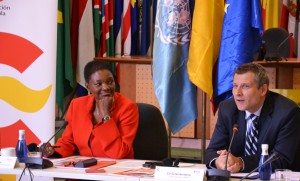October 16, 2013

Valerie Amos and Ed Schenkenberg
AECID (Spanish Agency for International Development Cooperation) and DARA welcomed Valerie Amos, UN Under-Secretary General and Emergency Relief Coordinator, to the first of three HardTalk dialogues on humanitarian action effectiveness on October 15th.
In humanitarian crises, such as Syria and the Sahel, the needs of affected populations far outweigh available resources and capacity to respond. Therefore, it is not surprising that the effectiveness of aid is one of the most important challenges for the humanitarian sector. However, the idea of what effectiveness actually means is subject to debate. Defining, measuring and improving humanitarian effectiveness has been proposed as one of the main themes for the World Humanitarian Summit announced by the UN system for early 2016. How effective is humanitarian action in contexts where access and funds are limited? What does effectiveness actually mean given these limitations?
Ms. Amos, together with DARA’s Chief Executive Ed Schenkenberg, AECID Director and Secretary-General of International Development Cooperation Gonzalo Robles Orozco, and Head of the Humanitarian Action Office Manuel Sánchez-Montero, and representatives from Spanish NGOs, debated how global humanitarian challenges compromise humanitarian effectiveness.
Some major discussion points included:
- The importance of building bridges and making the humanitarian system more inclusive. For example, making the preparation process for the World Humanitarian Summit more united by encouraging the collaboration amongst governments, civil society and NGOs
- The clear connection between effectiveness and respect of core humanitarian principles
- The challenges of measuring humanitarian effectiveness, especially considering specific types of disasters, such as conflict situations which are complicating ground operations more than ever, food insecurity, or slow onset disasters. Using simple indicators, such as just strictly saving lives may not be sufficient in increasingly complex crises environments, where it is also important to help build a future for those lives
- The important balance between the responsibilities of the development world, the humanitarian community and individual governments. There is a need to drive change throughout the system so everybody steps up to the plate and does their part
- The need to understand political agendas and try to influence them so that humanitarian work remains relevant
- The inexcusable fact that some parts of the world sink into famine recurrently when capacity and resources are available to prevent this
- The lack of consensus on the issue of NGO certification and how this process may not solve the humanitarian dilemma the sector is facing
- The need for clear and thoughtful approaches to partnerships with private sector entities, ensuring that each side has a clear understanding of the benefits and expectations
- To unlock humanitarian access in Syria, the urgent need for a similar strong international consensus as seen with the chemical weapons inspectors
- The need for humanitarians to be modest about their capacity, humanitarian crises cannot be solved by humanitarian actors alone
- The need for humanitarian actors to mobilise development colleagues on building resilience, as the large majority of the responsibility lies in development, and only around 10% falls on the humanitarian sector
The next two HardTalk Events will take place in November with ICRC President Peter Maurer (5 Nov) and ECHO President Claus Sorensen (14 Nov). View HardTalk programme
Event photos
[flickr-gallery mode=”photoset” photoset=”72157636617832066/” pagination=1]
Share this